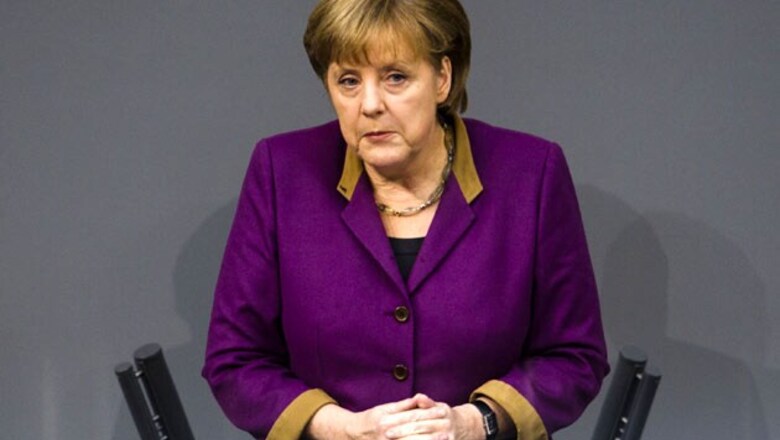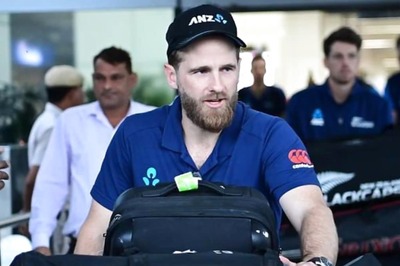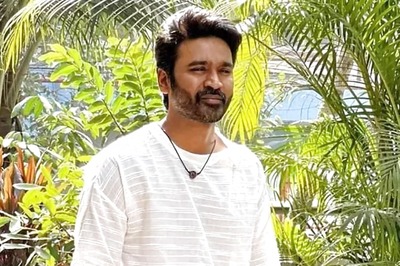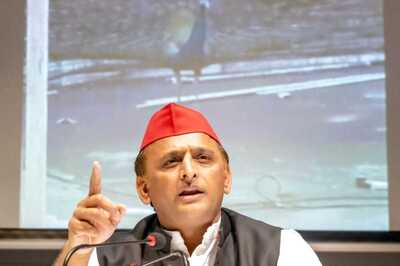
views
Berlin: Germany on Thursday pressed India to hike the foreign equity cap in the insurance sector and reduce tariffs on import of automobiles as a prelude to the much-awaited India-EU Free Trade Agreement even as the two countries signed six pacts including one under which a German loan of Euro one billion (Rs 7,000 crore) will be provided for a green energy corridor in India.
After talks with Prime Minister Manmohan Singh, German Chancellor Angela Merkel said that India and the EU have not yet overcome "all the difficulties" in reaching an agreement to conclude the FTA.
India is pressing Germany, the biggest economy in Europe, to provide a "strong political thrust" for inking of broad-based Bilateral Investment and Trade Agreement (BITA) with the 27-nation European block. Merkel, who jointly co-chaired the second round of Inter-Governmental Consultations (IGC) with Singh, however, minced no words when she said that the increase in the insurance cap by India was "undeniably" an important issue apart from resolution of issues such as tariff rate quota on imports of German cars, Services and Intellectual Property Rights.
"We want progress in the signing of the EU-India free trade agreement. We are in a situation where it seems as if we can get there. We have not yet overcome all the difficulties," Merkel told reporters while appreciating Indian side to be "accommodating" in paving the way for inking of the pact.
Singh on his part said that he and Merkel were agreed on the "importance" of an early conclusion of a "balanced" India-EU FTA. "We agreed on the importance of an early conclusion of a balanced India-EU Broad Based Trade and Investment Agreement," he added.
Assuring his government's committment towards liberalising the insurance sector, the Prime Minister said the Union Cabinet has already approved a proposal and it is awaiting Parliamentary approval. The Cabinet has cleared the hike in FDI in insurance sector from the current 26 per cent to 49 per cent.
A hike in FDI in India s insurance sector is critical to close the Indo-EU FTA. Germany, one of the world's largest exporters, also has worries about import duties in India on automobiles. Germany, which inked six pacts with India in diverse fields including education, agriculture and clean energy, will provide concessional loans of up to Euro one billion over the next six years to foster increased use of renewable energy in India through technical and financial cooperation by way of integrating additional renewable energy generation capacity with the national grid.
The Technical cooperation would be implemented through the German Agency for International Cooperation. "Economic ties have been a defining feature of our relationship. Germany is one of our largest economic partners globally. I encouraged increased German participation in India s rapid economic growth and our plans to modernize and upgrade our manufacturing and infrastructure sectors.
"Our Infrastructure plans entail investment of a trillion dollars in the next five years. I also sought continuing openness and support to growing Indian presence in Germany, including in the services sector," Singh said. Besides bilateral relations, Iran, Afghanistan and steps to combat terrorism were among other issues that figured during the IGC.
Asserting that the India-EU FTA has reached a "dynamic stage" of negotiation process, Merkel said "Insurance is undeniably an important subject matter from the point of view of Europeans.... And Indian government has been expressing its recognition of that fact so as to prepare the ground for respective action from the Indian side.
"Now for a country like Germany, given the importance of the automobile sector in my country, it is important for us that automotive industry receives an appropriate treatment." She also said while on some subjects the two sides have not made progress there are issues like agriculture where no more discussions are required, terming it as a "step forward".
The German leader also stressed on the need to resolve issues like services and safeguarding Intellectual Property Rights (IPRs), saying "we need to keep negotiating as is the case with IPR".
Admitting that there have been issues which have "held back conclusion" of broad-based Trade and investment, Singh said, "there are problems in the level of tariff protection we could give to Indian automobile sector. We had a thorough discussions on this subject. I hope that when (India-EU) ministers meet later this week in Brussels, further progress can also be registered."
On reforms in insurance sector, he said, "I have explained that we are committed to liberalisation in insurance sector on FDI equity participation.
"Our cabinet has already approved a proposal to raise the level of the foreign equity participation from 26 per cent to 49 per cent but this requires Parliamentary legislation". The negotiations for the free trade pact, officially dubbed as Bilateral Trade and Investment Agreement (BTIA), was started way back in June 2007. India and the EU have missed several deadlines to conclude the talks mainly due to the differences on issues related with market access and IPR.
The EU wants India to agree for a more strong IP regime and data security besides market access in services like banking and insurance.
Later, briefing the reporters on Singh-Merkel talks, Foreign Secretary Ranjan Mathai said the two leaders did discuss specific issues of India-EU FTA but they did not do it as "negotiators" but as principals who will give policy direction to their respective governments. Apart from trade issues, the two leaders also discussed crucial international issues such as combating terrorism, Afghanistan, Iran's contentious nuclear programme and situation in Syria.
"Chancellor Merkel and I agreed to continue with our efforts through the G-4 for the reform of the United Nations Security Council to reflect the current realities. We also emphasised the importance of sustained international support to Afghanistan through its transition to a stable, peaceful and democratic future.
"We called for an end to violence in Syria and a peaceful resolution of the Iranian nuclear issue. We underlined our shared interest in peace and stability in the Asia Pacific region, including on the Korean peninsula," Singh said.
On Iran, Merkel said they discussed the issue "briefly" with eye on the ongoing (P5+1) talks. "I am personally disappointed that the ongoing negotiations have not proven successful. As far as Germany is concerned, we are quite concerned there."
Prime Minister Singh on his part talked about the issues such as India's dependence on Iranian Oil and presence of Indian population in that region while reiterating the country's position. While supporting Iran's right to pursue its civil nuclear ambitions for peaceful purposes, Singh also said as a NPT signatory Tehran should not embark on a nuclear weapons programme. The Prime Minister also said diplomacy should be given greater chance to resolve this "complicated" matter.
The talks among five UN permanent members and France and Iran are being held with focus on Tehran's contentious nuclear programme. The US, Israel, and some of their allies have repeatedly accused Iran of pursuing non-civilian objectives in its nuclear energy programme.
Iran rejects the allegations, arguing that as a committed signatory to the Non-Proliferation Treaty (NPT) and a member of the International Atomic Energy Agency (IAEA), it has the right to use nuclear technology for peaceful purposes.
To a question on Eurozone crisis, Merkel and Singh hoped hoped that it will be solved with the "resolve and strength" of the countries in the region.


















Comments
0 comment